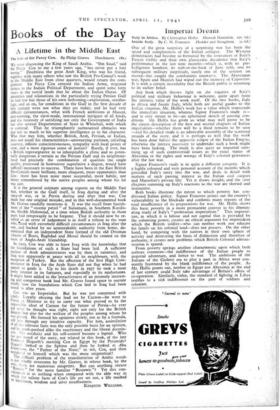B o oks of the Day
A Lifetime in the Middle East
The Life of Sir Percy Cox. By Philip Graves. .Hutchinson. t8s.)
WE were discussing the King of Saudi Arabia. "Ibn Saud," said Sir Percy Cox to me a few years ago, "has never put a foot wrong." Doubtless the great Arab King, who was his friend, together with many others who saw the British Pro-Consul's work in the Middle East from close quarters, would return the com- pliment. Sir Percy Cox entered the Indian Army, migrated thence to the Indian Political Department, and spent some forty years in the torrid lands that lie about the Indian Ocean. Of amenities and relaxations in the particularly trying Persian Gulf he had few but those of his own fashioning—exploration, ornitho- logy, and so on, for conditions in the Gulf in the first decade of this century were not what they are today; and he had very difficult circumstances, what with French ambitions at Muscat, gun-running, the slave-trade, international intrigues of all kinds, and the necessity of satisfying• not only the Government of India but also several Departments of State in Whitehall, with which to contend. That -he triumphantly surmounted obstacles was due not so much to his superior intelligence as to his character. Who that met him, whether. British, Arab, Persian, or Indian, does not recall his characteristics—unwearying patience unfailing courtesy, infinite conscientiousness sympathy with local points of view, and a most rigorous sense of justice? Rarely, if ever, has a British represetztative in so inhospitable a clime and so poten- tially dangerous a %terrain as the Persian Gulf and its neighbour- hood had precisely the combination of qualities (no single quality, possessed in howsoever superlative a degree, would have "sufficed) necessary to success. There have been in the East British Pro-Consuls more brilliant, more eloquent, more opportunist than Cox: there has been none' more successful, more habile, nor better remembered by the native peoples among whom his lot was cast.
It is the general-. estimate among experts on the Middle East that, whether in the Gulf itself, in Iraq during and after the 1914-18 war, or in Persia during and after that war, Cox made but one original mistake, and in this well-documented book Mr. Graves candidly mentions it. It was the recall from banish- ment of the "stormy petrel" of Sulaimani, in Southern Kurdis- tan, Sheikh Mahmond, at a time when British authority in those parts had temporality to be forgone. That it should now be re- called as an error of judgement is in itself a tribute to the man who, ?aced with extremely - difficult circumstances in Iraq after the war, and backed by no unmistakable authority from home, de- termined that an independent State formed of the old Ottoman vilayets of Basra, Baghdad and Mosul should be created on the basis of Anglo-Arab friendship. In 1923, Cox was able to leave Iraq with the knowledge that the foundations of stich a State had been laid. A sufficient nucleus of Arab administrators was by then in existence, and Iraq was apparently at peace' with -all its neighbours with the exception of Turkey. But the affection-of the first High Com- missioner in Iraq for the Arab State did not flag when he had ceased to guide it. Up to his death in 1937 he took a most lively interest in its fortunes, and especially in its misfortunes. It might have added to the 'attractiveness of an intensely interest- ing and competent book had Mr. Graves found space to narrate briefly how the foundations which Cox laid in Iraq had been tested in after years. Cox was an Imperialist. But he was not concerned with libel. Loyally obeying the lead set by Curzon—he went to Persia as Minister to try to carry out what proved to be the impossible ideal of Curzon for the future of Persia—he ever did what he thought was right, right not only for the British Empire but also for the welfare of the peoples among whom he was placed. He formed his opinions slowly, not as by a formula, still less through any intuitive capacity. For him, assimilation of all the relevant facts was the only possible basis for an opinion, and he pooh-poohed alike the reactionary and the liberal doctrin- aire. His assiduity and his self-control became a legend. Who litas not heard of the story, not related in this book, of the late it'fessor Hogarth's meeting Cox in Egypt by the Pyramids? Hogan}, looked-at the Sphinx and then he looked at Abu Khartoum, the "Father of the No-se," to wit, Cox, and then wondered to hirnself which was the More enigmatical! The difficult problem, of the transliteration of Arabic words Is not wholly overcome, by Mr. Graves, in whose book, by the way, there are numerous misprints. But can anything excuse :.asrans " for the more familiar " Basrawis "? Yet this con- -15e.ration is as nothing .when compared with the able way in !Melt the Salient facts of (oes life are set out, a life marked DY kindlineas, wisdom and utter steadfastness.
KENVETH WILLIAMS.






























 Previous page
Previous page